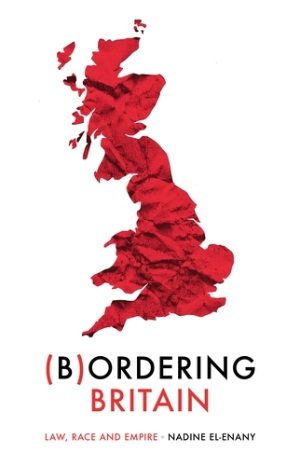
(B)ordering Britain presents a powerful case that immigration law is rooted in the racism of Empire, and that migrant solidarity must be anti-imperialist, finds Alyssa Cassata

In (B)ordering Britain, Nadine El-Enany conclusively demonstrates the inherent connections between colonialism and immigration law. She argues that:
‘A bordered Britain, with its wealth and infrastructure secured via colonial conquest withheld from poor racialised people within and outside its borders, in defiance of claims for reparation and restitution, makes Britain a contemporary colonial space’ (p.27).
She warns that recognition-based approaches to migrant solidarity that rely on acceptance of immigration law can be harmful due to the latter’s roots in imperial violence, and later provides alternative, anti-imperialist strategies that more effectively fight for justice.
Throughout the book, El-Enany examines immigration laws and their effect from the 1905 Aliens Act to the 2016 EU referendum and its outcome, providing relevant examples to demonstrate the racist nature of immigration law and eloquently illustrating how it presents a continuation of colonialism in a supposedly ‘post-colonial’ Britain.
She begins by exploring the relationship between empire and immigration law whilst revealing how it has been used to maintain the white-supremacist project of colonialism by ‘allocating life and death on the basis of whether or not a person meets the criteria for a legal status’ (p.24). Her analytical style of writing relies on convincing examples such as the 2018 Windrush scandal and the devastating case of ‘N v. Secretary of State for the Home Department’ (from 2005) where a woman, who knew she wouldn’t have access to the life-saving treatment she was receiving in the UK, subsequently died within three months of being deported to Uganda by the courts. These examples illustrate the racist effects of immigration law (despite race-neutral language) and the disastrous consequences for victims’ lives.
El-Enany suggests that by ignoring the colonial context from which immigration law originates, lawmakers and politicians are permitted to present asylum seekers and people without a legal status in Britain as ‘a drain on resources understood as belonging to Britons’ (p.166), suggesting that colonial amnesia feeds both imperial nostalgia and allows for the continuation of colonial dispossession. A recent YouGov poll, published this year, reveals that the history-effacing mainstream narrative has fuelled imperial nostalgia within the public as, of those that responded to the poll, 32% saw Britain’s former empire as something to be proud of, with just 19% viewing it as something of which to be ashamed.
(B)ordering Britain exposes the harsh realities of ‘genocide, mass murder, slavery, dispossession of land, exploitation of labour and theft of resources, all predicated on white British supremacy’ (p.8) that were innate to colonialism. By not facing these realities, Britain has been allowed to ignore its obligation to pay reparations to colonised countries and instead preserve imperial violence through immigration law, highlighting the importance of a more realistic narrative that can be found in (B)ordering Britain.
El-Enany also identifies issues in a recognition-based approach to migrant solidarity. Using the 2018 Windrush scandal as an example, she highlights that the government ‘refused to include in the numbers of those wrongfully expelled so-called “foreign criminals”’ (p.93), arguing that this presents them as ‘unworthy of legal rights because they have not met the standards for inclusion set by the colonial state’ (p.94). This argument is equally applicable to the deportation of seventeen people to Jamaica, occurring in February this year, following public outcry and protest. Former Chancellor, Sajid Javid, defended this decision stating ‘these are all foreign national offenders’, demonstrating Britain’s deep-rooted colonial amnesia.
These cases expose the devastating impacts of the widespread acceptance of immigration law that is rooted in an empire built on racial violence. El-Enany asserts that ‘understanding migration law as a racial regime of power, as part of a colonial edifice, allows us to see the danger of accepting legal categories as givens’ (p.27). Embracing this argument could allow for more effective approaches to migrant solidarity and, more widely, disrupt the whitewashing of history that has allowed the government to dismiss arguments for reparations.
El-Enany concludes that ‘recognition processes force apart what might otherwise be collective claims for racial justice’ (p.223,) arguing that ‘while law-abiding members of the Windrush generation might be saved from racial exclusion, those with criminal convictions have been constructed as fair game for extreme forms of racial state violence’ (p.223). She argues that ‘challenging the legitimacy of the colonial state’ (p.223) should form the basis of solidarity and that recognition-based strategies reinforce the history-effacing narrative that has been established in Britain, allowing ‘successive governments…to shroud their reparative obligations’ (p.223).
(B)ordering Britain offers a unique insight into the connections between empire and immigration law that expose the way Britain has been allowed to ignore its violent imperial history and preserve it through law whilst claiming to be a ‘post-colonial’ state.

